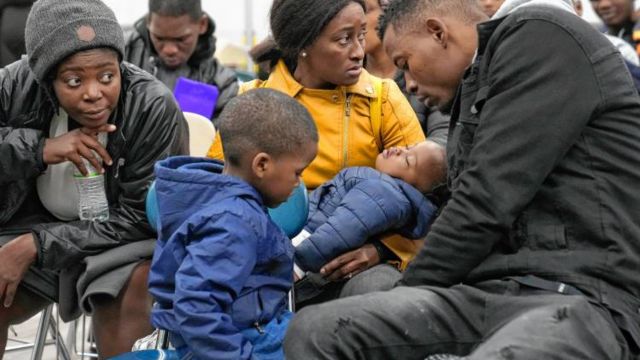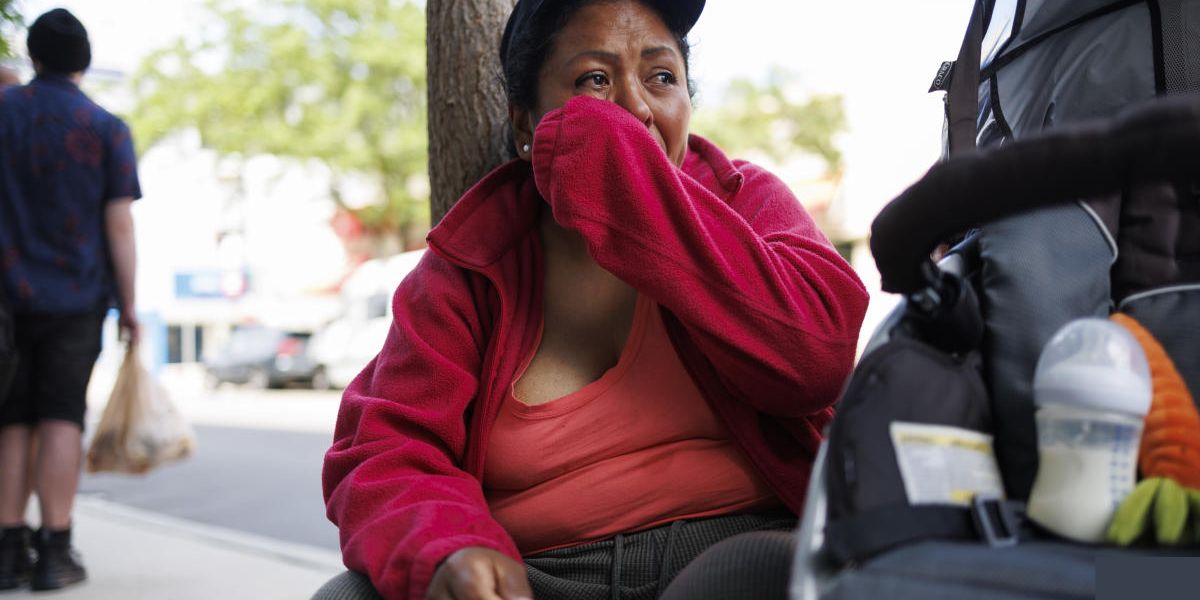Migrant Woman’s Husband Disappears Amid Job Hunt, Reflecting Widespread Struggles
DEBARYLIFE – Jessica Juma’s spouse vanished on her first week of employment. The husband and couple from a small Ecuadorian village had been looking for work in Chicago for almost six months. They had visited clinics and stood in front of supermarkets begging.
After finding a therapist, the 36-year-old mother was able to find relief from her trauma and secure the necessary documentation to work lawfully. Her husband informed her that he was glad she was working when she was offered a position packing fruits and vegetables at Mariano’s in Lakeview. However, the 37-year-old was still unemployed. The strain was wearing thin.
Juma’s husband was begging outside the store on May 25 as she was working inside with their 15-year-old son, 19-year-old daughter, and 6-month-old grandson. He informed the teenagers that he was going to purchase new shoes just before 8:30 a.m. He then departed and didn’t return.
It was unremarkable. Juma stated, “Everything was normal, but we never heard from him again.”
Juma has been crying herself silent for weeks since he vanished. She called his name, Angel Mashiant, as she strolled along the lakefront. She has approached police cars to beg for assistance and filed a complaint on a missing individual.
She doesn’t sure what to do because the cops have not responded to her.
Although Juma’s husband’s fate is unknown, the migrant mother highlights a common occurrence for recent immigrants: some migrant men appear to disappear from their relationships with their partners and children, leaving them to fend for themselves, even after traveling thousands of miles to reach the United States.
Since August 2022, over 43,000 migrants have traveled through Chicago on busses and airplanes after being sent from the southern border. Hundreds of single women with children are being housed in the 17 shelters that the city and state jointly manage. How many of them had come with partners is unknown.
Without the support of their partners, the remaining women are now attempting to find employment while taking care of their kids.

Licensed therapists and those who work closely with migrants speculate that men’s decision to simply walk away may have been influenced by the frustration and guilt they feel over not being able to support their families.
Ana Gil-Garcia, the founder of the Illinois Venezuelan Alliance, who has given instructional talks to migrants at numerous shelters throughout the city, stated, “We see cases like that.” Men choose to depart when they are unable to offer. When they refuse to accept accountability, mom is left to raise the kids.
“I’m not sure if I can make a name for myself here by myself.”
Nareida Santana, 37, of Cartagena, Colombia, spoke of her and her partner’s days-long journey over six nations to arrive in Chicago at the end of April as she stood outside a migrant shelter in the West Loop on Tuesday.
SEE MORE –
Midtown Homeless Center At Risk Of Closing After City Withdraws Support
He abruptly left, she stated, around two weeks ago. She is unaware of his whereabouts. As she spoke, she moved her weight back and forth.
She now has to take care of her 7-year-old kid by herself. The list of tasks is long: seeking work and accommodation, using public transportation, enrolling him in school.
She exclaimed, “I’m so scared.” “I’m not sure if I can make a name for myself here by myself.”
According to Santana, she is aware that there are ladies in worse circumstances than her own—wives who have abandoned them, pregnant women, and people in critical need of medical attention.
She claimed that although shelter staff are advising her on how to interview for employment, this advice is meaningless until she obtains a legitimate work visa.
She is currently working extremely hard to get employment so she can leave the shelter.
“It’s hard to get much sleep in there,” she remarked, pointing to the five-story brick warehouse housing more than 700 refugees.
This spring, at the Parent University in Pilsen, Veronica Sanchez, a licensed social worker, hosted a series of healing circles for migrants as part of an initiative spearheaded by the mutual assistance group Southwest Collective. According to Sanchez, migrants discussed the trend of men openly divorcing their wives.
SEE MORE –
Dallas Homeless Center Organizes to Help Homeless Community During Hot Weather
In another room, where volunteers provided hot meals and childcare, adult asylum seekers participated in group therapy sessions covering subjects including anxiety, despair, and gender norms. Many people, according to Sanchez, haven’t had time to consider their mental health since they have been so preoccupied with meeting their basic necessities.
She noted that occasionally, this results in last-minute splits.
“At the beginning, we talked a little bit about depression,” Sanchez added. “I assured them that we would have frank conversations about any melancholy they may be experiencing.”
Midway through May, Sanchez facilitated a group discussion on the elements of a healthy partnership.
“I’ve seen long-term partners come here and completely change everything,” a Venezuelan woman, whose identity is withheld due to privacy concerns, said. “How can they not remember everything they’ve gone through? I know it’s difficult here.”
“Not my ideal of America”
The city does keep track of the makeup of the families living in its shelters, but it was unable to quickly reveal the number of unmarried immigrant women with children now residing there. According to city officials, case managers recommend NGOs to shelter clients in need of mental health assistance. Hundreds of shelter employees are also trained by the city on how to support women who may be victims of gender-based violence, such as domestic abuse.
A spokeswoman for the city stated in a statement, “Mayor Johnson believes that all Chicagoans deserve mental and behavioral healthcare, whether they have been here for generations or just arrived.”
Staying at the same shelter as Juma on the Lower West Side, Yoleida Ramirez, a 42-year-old single mother from Caracas, Venezuela, said she has been looking for secure job in Chicago since November but hasn’t been successful.
After being placed in a shelter in December with her three young daughters, the staff has informed Ramirez that she must find independent lodging by June 23. She fears that she will not be able to.
She said, “It’s so difficult,” while crying. “I’ve searched far and wide, but I can’t find employment.”
She heads to Home Depot after dropping her kids off at school at seven in the morning, hoping to find a job painting or cleaning.
She claimed that she fled her own country since she was unable to find employment there as well. She didn’t have enough cash to feed her kids.
She remarked, “I’d heard of the American dream, but this is not my dream.”
Juma claimed that on their last morning together, they got up early in the shelter, and he made fun of her for being late for her shift at Mariano’s. He handed her a pair of socks and two dollars for the bus, and she put on an apron.
While Juma was inside working, Mashiant and their family were outside panhandling Mariano’s. While he went to get new shoes, he ordered his kids to wait. He turned on his hood and strolled by the bins. Since then, no one has seen him.
Juma waited with her kids when she finished her duty. She stated he always returned. However, hours went by with no sign of him. The following day she submitted a police report.
Even now, weeks later, Juma is hurt by the lack of closure. She still doesn’t believe he’s gone.
When she phones to inquire about the status of her missing person complaint, the persons who answer understand only English, so she has had difficulty verifying that the police have processed it. She believes they have given up trying to find Mashiant.
The Chicago Tribune received a comment from a Chicago Police Department spokeswoman saying, “The report has not been finalized at this time.” Since most missing person reports are completed on paper, we do not have access to them.
Juma claimed that on June 2, the shelter informed her that she would no longer be included in the system since Mashiant had vanished. She added that they have now withdrawn that, but Juma sobs when she discusses it.
She claimed, “They threatened to take away his cot.”
She has exhausted all options in her search for him. She hung posters on lampposts outside the supermarket. She was able to collect video footage of him walking through the alley, swinging his arms and glancing at something in the distance, from a nearby shop.
She is at a loss for answers, though. She cries every time she talks about him. She speculates that he might have attempted to commit suicide in the lake. Seeking for traces of his floating body, she meanders along the shore.
“He was not acting rationally.”
Juma and her family are new to Chicago, just like many other migrants who fled the violence and poverty of their home countries in Latin America. She claimed that the change was challenging and that they had faced criticism for their panhandling.
She claimed that a man had thrown food at them and expressed his desire that Trump would win so they might be deported back to their own country.
Juma claimed that her 19-year-old and her 15-year-old had experienced consecutive instances of gang violence, which led to their family fleeing their small Ecuadorian agricultural hamlet in late September.
They chose to depart Ecuador after their family started receiving more and more threatening phone calls. It was December when they got to Chicago. She said that she was abducted in Mexico for five days while traveling here with her spouse and son.
Juma had discussed her challenging history with Erika Meza, a licensed master social worker at Onward House in Belmont Cragin who works with migrants in group therapy sessions, prior to her husband going missing. Meza claimed to have a particularly deep bond with Juma.
The Ecuadorian mother had been expressing worry about her unstable income for months, according to Meza. Juma is presently sleeping in a shelter, and the shelter administrators were threatening to kick them out.
Meza claimed to have assisted the couple in submitting the necessary documentation to be able to work lawfully in the US, but Mashiant continued to apply for jobs.
Meza stated, “He was starting to get really sad, staying at the shelter.”
Although Juma said that group therapy had helped her better understand and manage her depression, she had advised her husband to go as well, but he had not.
Meza believes that Mashiant fled out of fear.
She declared, “I don’t think he was in his right mind.” “Anxiety and depression can lead you to take actions you never would have thought possible.”
Still looking
The quiet man who married Juma had grown up in the Ecuadorian bush. He was not able to write or read.
Juma asserts that since he doesn’t know anyone here, she is aware that the other women at the shelter who claim he must have departed with another woman are lying.
“All I need is for him to show up so I can cover the cost of our destination. That’s what we had planned. We intended to work in order to pay for our housing,” the woman stated.
Juma is now left to do everything by herself, just like many others. She needs to pick up her son from school and go to work.
Juma was informed by a street sweeper outside Mariano’s on Wednesday morning that she could ride the bus west to the final stop, which was next to a lake.
Juma climbed onto the CTA bus with her grandchild strapped inside a carriage. After riding it to the final stop, she got off and took a look around.
“Is there a lake close by?” Confused, she said.
Lake Michigan was five miles away from her. Reality began to sink in slowly. Her expression fell.
To return to the Mariano’s where her husband had first vanished, she waited at the bus stop.










